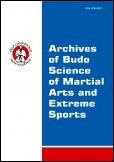2021, Volume 17, Issue 1
Adaptive effects of long-term ignoring Cannon's "fight or flight" law in physical education and adapted physical activity
Bartłomiej Gąsienica Walczak1, Dawid Dobosz2, Roman Maciej Kalina3
1Health Institute, Podhale State College of Applied Sciences in Nowy Targ, Nowy Targ, Poland
2Physiotherapist at EPIONE Sp. z o.o., Katowice, Poland
3Faculty of Health Sciences, Lomza State University of Applied Sciences, Lomza, Poland
Author for correspondence: Bartłomiej Gąsienica Walczak; Health Institute, Podhale State College of Applied Sciences in Nowy Targ, Nowy Targ, Poland; email: bgw@interia.pl
Full text
Abstract
Background & Study Aim: Estimating how many physical education (PE) and adapted physical activity (APA) practitioners uncritically accept warm-up guidelines composed by sports theorists and practitioners is difficult. The cognitive purpose of this study is justification (based on empirical evidence) for the statement that the effect of many years of repetition of warm-up in the form of running "single file" is to deprive PE or APA participants of the possibility of adequate motor response in situations of sudden threat – either external or internal (concerning the psychophysical state of human) of origin.
Material & Methods: The premises for conducting multiple experiments arose from the third author's fifty years of experience. They encompass: teaching academic subjects (theory and practice) related to PE, APA, and sports training; participation in competitions in various individual disciplines and combat sports, teams and military all-around events. Experimental observation (more than 300 classes with physical education or physiotherapy students and judo practitioners) had a simple structure of a fun form of exercise, „fast shopping”. First, students were instructed to run in various directions but in such a way that they won’t collide with each other (a crucial element of the task). After students started performing the exercise, the instructor stimulated them to do it correctly for over a dozen seconds. Then, he began pretending not to monitor them (“completing documentation”, “tying shoelaces”, etc.). He acted like that until all students spontaneously started running “single file”. Experimental observations occurred in different locations (gym, sports ground or its section).
Results: The time interval length (from the onset of “no monitoring” to the moment when every student runs a “single file” was associated with the size of the surface (the smaller size, the shorter time). Surface size for the shortest (6 sec.) and the longest time interval (60 sec.) recorded were 8x5 m and 28x15 m (basketball court) and larger surface, respectively.
Conclusions: Running “single file” or “frontally – all in one direction” are fundamental elements of routine warm-up. As such, they make it counterproductive concerning its role in preparing people to perform an adequate motor response to hazardous situations, especially those related to personal security (collision with an object in motion, fall after overbalance or assault). Since that, an optimal warm-up should not only boost the physiological potential of an organism but also facilitate learning or cultivating unique motor competencies like avoiding collision with an object in motion, safe fall techniques and elements of self-defence.
Key words: avoiding a collision, counterproductive, safe fall, self-defence, warm-up





